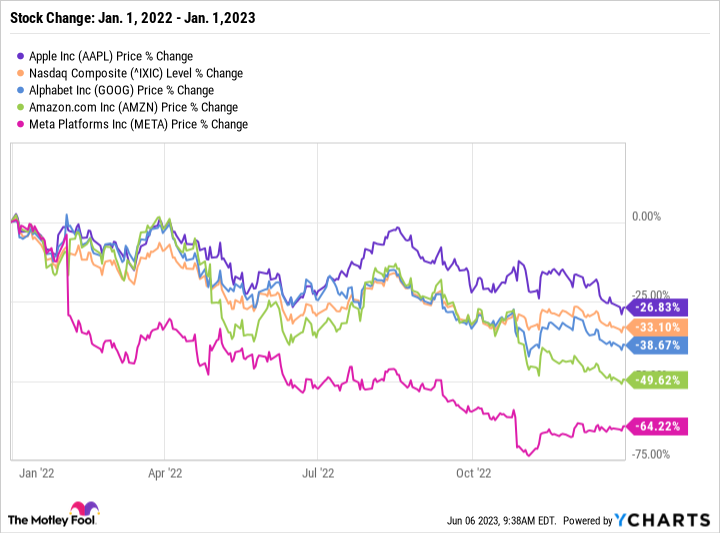There’s a buzz on Wall Street and in the tech world surrounding Apple (AAPL 0.78%) right now after its Worldwide Developers Conference (WWDC) on June 5.
The event saw the company announce a 15-inch MacBook Air, beefier Mac Studio, the long-awaited Apple Silicon Mac Pro, and many software updates across its product lineup. However, the biggest news from WWDC was its highly anticipated first step into the virtual/augmented reality (VR/AR) market with a new headset called the Vision Pro. The totally new product has massive potential over the long term and could change the face of computing and home entertainment if all goes according to Apple’s plan.
Alongside the product announcements, Apple’s outlook is growing stronger thanks to easing inflation. The consumer price index has improved for ten consecutive months, with prices rising 4.9% in April after hitting a high of 9.1% in June 2022. The correction could trigger a new bull market as different companies report revenue gains over the next year.
A bull market might be coming, so here are two reasons to buy Apple stock.
1. The AR market is projected to hit $461 billion by 2030
Apple’s Vision Pro has put it on top of the high-growth AR industry. While companies like Sony and Meta have released virtual reality devices, which have been primarily adopted by gamers, no headset has delved as deeply into augmented reality as Apple has. The iPhone company’s Vision Pro is an entire computer in the form of a headset, allowing for countless use cases.
The product makes it possible to overlay your environment with anything from productivity programs like word processing and video editing to entertainment activities such as watching films and sports games. Meanwhile, a dial on the Vision Pro lets users switch to a fully immersive VR environment for more focused activities.
According to data from Market Research Future, the AR market is expected to reach $461 billion in 2030, expanding at a compound annual growth rate of 42%. As Apple’s Vision Pro grants users far more AR capabilities than other available headsets, it is well positioned to profit significantly from that growth.
While Apple’s new headset has taken leaps in the innovation of AR and VR, it will likely be held back by its price of $3,500. The high cost means this first-generation device will be out of reach for many consumers. However, that doesn’t mean lower-priced versions won’t take off with the public in the coming years. Apple’s solid history of taking existing technology and using its unique designs to bolster consumer adoption makes its stock immensely attractive right now.
2. Apple shows stability in uncertain times
Alongside a strong outlook in AR and VR, Apple is home to a consistently stable business. Amid macroeconomic headwinds in 2022, countless companies suffered from a marketwide sell-off. While Apple was not unscathed, its stock tumble was the only one among some of its biggest competitors to outperform the Nasdaq Composite index (see the chart below).
Data by YCharts
Apple shares have risen 268% in the last five years. Meanwhile, the company’s annual revenue and operating income climbed over 48% in the same period. Apple has a reputation for being a solid growth stock thanks to consistent demand for its products. The company achieved leading market shares in smartphones, tablets, headphones, and smartwatches due to nearly unrivaled brand loyalty from consumers.
This allegiance by shoppers has fortified its business and provided investors with unyielding stock growth over the long term. As a result, it’s not surprising that Warren Buffett’s holding company Berkshire Hathaway has made Apple 47% of its portfolio. In fact, the iPhone company’s stock has increased by 575% since 2016 when Berkshire first invested in the company.
Apple’s dominance in consumer tech gives it the best chance of succeeding in the high-growth VR/AR sector. Along with a consistently expanding business, the company’s stock is an increasingly attractive investment ahead of a potential bull market.
Randi Zuckerberg, a former director of market development and spokeswoman for Facebook and sister to Meta Platforms CEO Mark Zuckerberg, is a member of The Motley Fool’s board of directors. John Mackey, former CEO of Whole Foods Market, an Amazon subsidiary, is a member of The Motley Fool’s board of directors. Suzanne Frey, an executive at Alphabet, is a member of The Motley Fool’s board of directors. Dani Cook has no position in any of the stocks mentioned. The Motley Fool has positions in and recommends Alphabet, Amazon.com, Apple, Berkshire Hathaway, and Meta Platforms. The Motley Fool has a disclosure policy.

